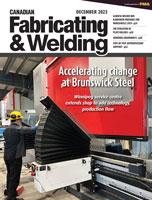Editor
- FMA
- The Fabricator
- FABTECH
- Canadian Metalworking
Training for the world
Alberta welder Ben Rainforth and instructor Lee Yasinski prepare for World Skills 2024 in France
- By Rob Colman
- January 22, 2024
- Article
- Welding
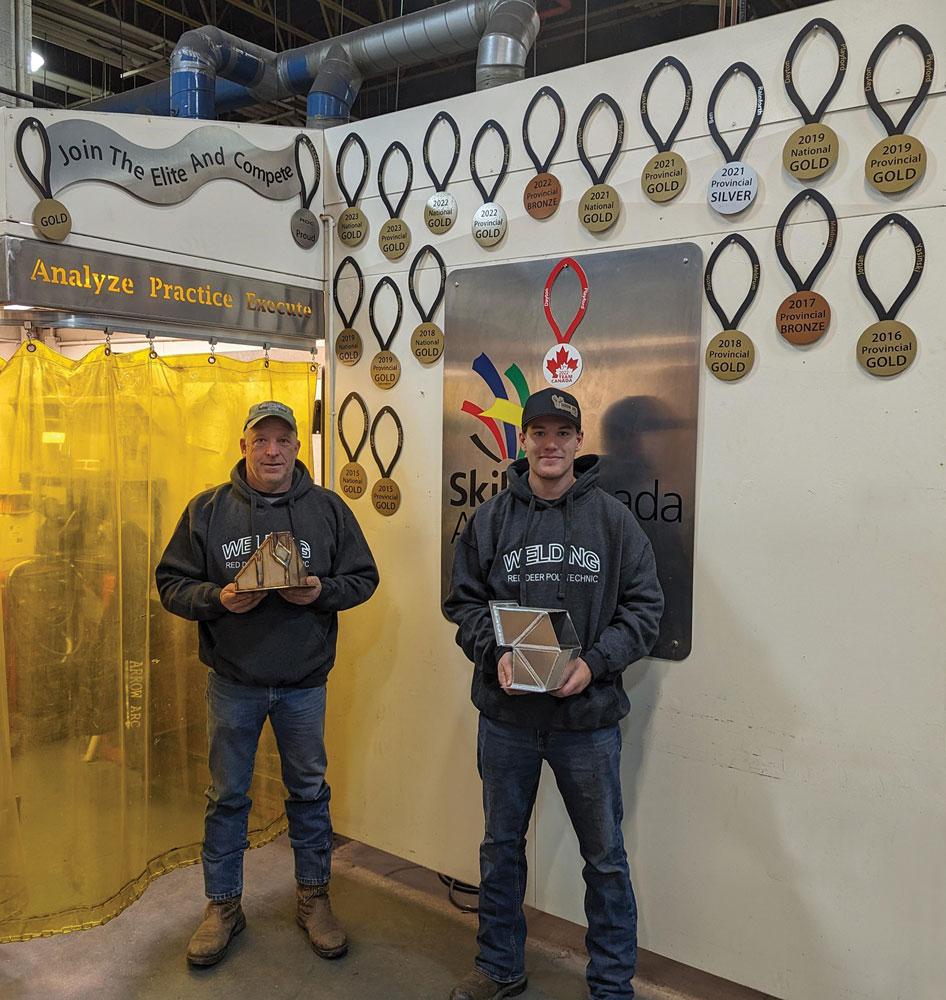
Instructor Lee Yasinski and WorldSkills competitor Ben Rainforth stand together in the Red Deer Polytechnic facility. Rainforth is training at the polytechnic over the next year, honing all of his welding knowledge and techniques. Photos: Red Deer Polytechnic
Each December, Canadian Fabricating & Welding profiles individuals who are impacting industry development—business owners promoting the trades or young up-and-comers bringing new talent to the workforce.
Featured this year is a young welding apprentice, Ben Rainforth, and his instructor, Lee Yasinski, who has guided him and many other students to succeed at Skills Canada and WorldSkills.
Ben Rainforth and RDP
Red Deer Polytechnic (RDP) Welding Apprentice Ben Rainforth earned a gold medal at the 2023 Skills Canada National Competition. He was among more than 500 Canadian students and apprentices who competed in 45 skill areas at the RBC Convention Centre in Winnipeg.
Rainforth’s accomplishment was the fifth consecutive gold medal by an RDP welding apprentice at the national level.
“I want to congratulate Ben and his RDP Welding Instructor and Skills Coach Lee Yasinski on the outstanding performance at the Skills Canada National Competition,” said Joel Gingrich, dean, School of Education and Trades, in a press statement from RDP. “Along with earning gold, Ben also won a Best of Region Award for achieving the best-weighted score from Alberta.”
With Rainforth’s achievement, RDP apprentices have earned 79 medals at the Skills Canada Alberta and National Competitions since 2003.
Family Foundation
Rainforth developed an interest in welding from watching his father work on the family farm.
“I was home-schooled until grade 10, so I pretty much did schoolwork in the morning and in the afternoon would help dad on the farm,” Rainforth said. “He was a welder, installing dairy barn equipment and, whenever something broke, fixing equipment around the farm. That piqued my interest. Then, when I got into high school and started taking shop classes, the interest just grew from there.”
The interest grew even further through his time in the School Within A College (SWAC) program at RDP. Students enrolled in the SWAC program attend high school courses taught by secondary school teachers during the first semester and then attend college level classes taught at the college during the second semester.
“That got me through my first year of welding theory,” Rainforth said.
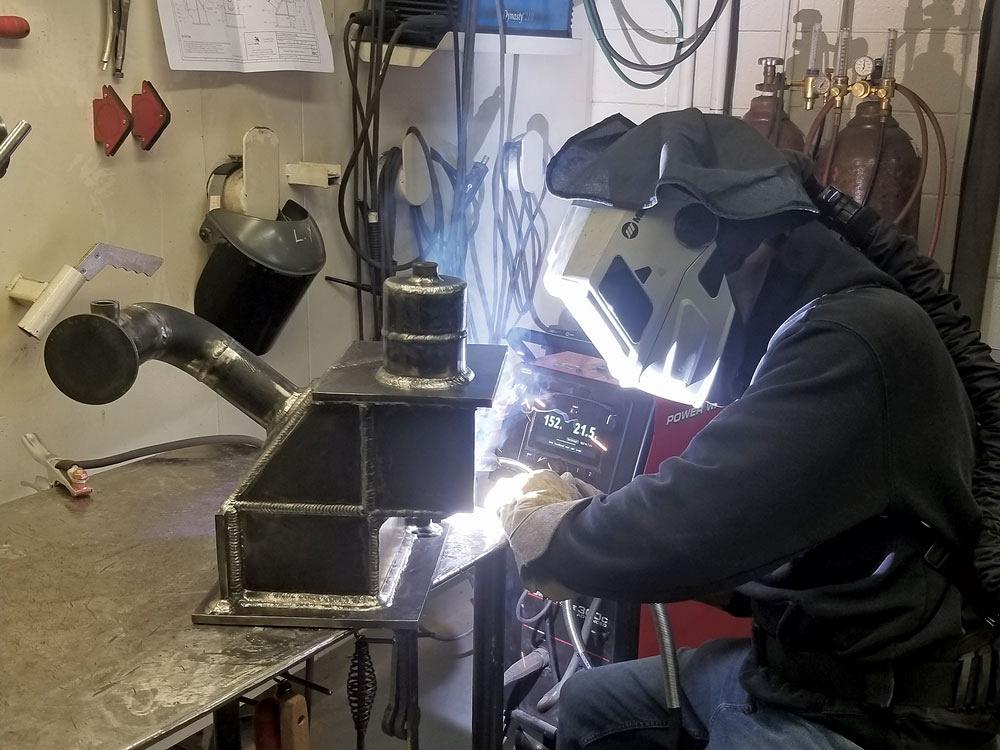
“What I’m getting is the highest level of training that anyone can get,” said Rainforth. “Through training, I’m really fine-tuning all of my welds to a greater degree.”
Skills Encouragement
Rainforth’s interest in skills competitions also was encouraged early on.
“My grandpa was a construction teacher at the high school. He took students to Skills and always talked about it,” said Rainforth. “In high school, I gave it a try for carpentry. When I started welding, I then competed in that. Although you compete for yourself, in the big picture, you can help a lot of people by promoting the trades. When others see you weld with such skill, it makes them want to try harder, do better. And it is really cool to just try and be better than you were yesterday, to try to beat yourself and then show up at a competition where there's other skilled people who think the same way you do, all trying to perfect their trade. It's a cool thing to be a part of.”
Through dedication and a variety of collaborations, Rainforth’s skills and knowledge have evolved, making him one of the best young welders in the nation.
“With the help of past competitors, Justin Meldrum and Dayton Playford, as well as the incredible instructors at RDP, I have grown and developed my skills to a level that few possess,” said Rainforth, who also earned gold at the Secondary Skills Canada National Competition in 2019 when he was enrolled in the SWAC program at RDP. “What I’m getting is the highest level of training that anyone can get. Through training, I’m really fine-tuning all of my welds to a greater degree.”
Rainforth and other gold medallists from the Skills Canada National Competition will represent their institution and Team Canada alongside the top apprentices in the world next year.
“To compete in the 2024 WorldSkills Competition in Lyon, France, is an extreme honour that has not come easy,” said Rainforth. “RDP has paved the way for my success, giving me the tools and resources that I need to excel in my trade. Having taken all three years of my technical training at RDP, I have been fortunate to have been instructed by the best of the best. With coaching and instruction from Lee, we have put in the time to become the national champion and can continue training at a world level.”
The 47th WorldSkills Competition will be held Sept. 10-15, 2024.
WorldSkills Challenges
The competition will be tough and held over three days. The welding competitors will be tested in a variety of ways. The first day requires the competitors to perform two groove welds, two fillet welds, and a pipe weld on mild steel. The five welds are chosen from a list of 19 possible welds the day prior to the competition.
The second day involves welding a mild steel pressure vessel that is then judged visually and hydrotested up to 1000 PSI to check for leaks.
The third day involves one aluminum TIG project and one stainless TIG project.
“They throw just about every type of welding there is at you,” said Rainforth.
Throughout his apprenticeship training, Rainforth has focused mostly on structural welds, doing a lot of MIG metal core and the occasional flux-core work. Out in the field, it’s all stick.
“Most welders will use one or two different processes day in and day out,” said Rainforth. “The hand skills I’m developing are something that not many people get access to. It’s great being able to get good at all these types of welds.”
To master all of the welds for the competition, Rainforth is training full time at RDP until the competition next year. He’ll likely help judge other competitions and take part in some practice competitions, but otherwise he is working on building that skill set for Worlds.
Team Support
Helping him get there is Lee Yasinski, welding instructor/Skills coach in the welding department at RDP’s School of Trades and Technology.
Like Rainforth, Yasinski grew up welding on his family’s farm.
“Growing up on a farm, you’re always troubleshooting, repairing, and building,” he said. Yasinski started his apprenticeship in the late 1980s and transitioned to teaching in secondary schools in the late 1990s. In 2002, he moved to RDP.
“I really enjoy helping people,” said Yasinski of his move into education. “It’s rewarding to see someone else succeed by helping them. And it’s great to see how much young competitors get out of their training. You see them grow and see the opportunities they gain from competing. Some of our past competitors have been given great opportunities to work at really big shops here in Canada and abroad. If you can be a positive influence for someone in your life, that’s a great thing.”
Yasinski first got involved in taking students to Skills competitions via another high school instructor where he once worked. Since then, he has supported students continually in achieving success at Skills competitions. In fact, he has helped coach five gold medallists in the past five years.
Yasinski insists it’s a team effort.
“We have our welding department, which is a strong team that supports each other,” he said. “The polytechnic plays an important role as well. They support us by cutting our materials and providing us an area to train. We also have really good industry sponsors out there that help provide us with additional materials, X-rays, and hydrotesting. Welding materials are very expensive, and we would not be able to compete at the world level without their support. Lastly, family support that our competitors have had is critical.”
Team Growth
Yasinski has nothing but praise for Rainforth.
“He has been very patient, watching other older competitors and learning from them,” he said. “I always try to find a younger competitor early so that they get a couple years’ experience competing at Skills, so they know about the anxiety of the environment and what it’s like to compete. They recognize that they aren’t going to get as much detailed time as the main competitor, but it prepares them for the future.
“Now it’s Ben’s turn to advance forward. And he’s doing an excellent job. He commits a lot to the training, and you need to be prepared to do that. And as an instructor, you need to be on task for that competitor, keep them on task and keep them positive when it’s a struggle.”
Yasinski brings back past competitors two or three times a year to interact with the welder in training to support their development.
“Having that support and an environment of respect is so important,” said Yasinski. “It’s such a detailed trade, and such a fine art at this level, every millimetre, every ripple counts. You don’t have much of an allowance over a millimetre. That’s the bottom line.”
Equipment Knowledge
Yasinski notes that understanding your power source become really important as well.
“Understanding the different waveforms that they use for the welds and the benefits of the different types of features they have in that power source are huge to compete successfully at the world level,” he said.
Each competitor will be using the Lincoln Power Wave 300C advanced process power source at the competition, so it’s key to train on that equipment.
“It’s important to know that equipment and then think outside the box and be creative,” said Yasinski. “Go where the manufacturer says you shouldn’t go because you’d be surprised what you can find. Tweaking a machine in a different way can produce such a subtle change, but it may be the change that makes a difference from losing a point and gaining one.”
Communication Is Key
Yasinski says training is as long and intense as it is because there is so much to master.
“It’s a lot of work just to be able to display excellence consistently in all those types of welds,” he said. “Then to be able to tweak that, to take it to another level, it’s just a bonus. Training is about creating a super solid foundation and achieving excellence in as many areas as possible. We have really good start points for developing because we have plenty of former competitors to refer to, so maybe we can advance a little quicker in some areas. But every individual has different dexterity and sees the job differently, so every competitor is unique. Part of my job is to really understand the competitor’s strengths and build from those.”
The key for Yasinski in the training process is good communication and trust.
“I teach and treat the student as I would want someone to treat my own children,” he said. “Being able to communicate is important, particularly when Ben is 25 practice welds in and things still aren’t working as they should. One-on-one conversations help navigate those tough times. The competitor becomes their own worst critic. And the variables are endless—the issue could be positioning, travel speed, step technique, inclination angle. Helping them home in on what the issue is helps get past what can become roadblocks.”
Mostly, Yasinski is just glad the skills competitions exist to support the trades.
“The fact that Skills Alberta, Skills Canada, and WorldSkills provide a venue for tradespeople to reach that level of excellence against each other is a great thing,” he said. “I think competition is one of the healthiest ways to grow. Challenging people this way always seems to help them rise and get better.”
Rainforth has enjoyed the journey so far and is keen to get on the world’s stage.
“I am very honoured to have this opportunity and am excited to represent not only RDP, but Alberta and most importantly, Canada,” said Rainforth.
Editor Robert Colman can be reached at rcolman@fmamfg.org.
About the Author

Rob Colman
1154 Warden Avenue
Toronto, M1R 0A1 Canada
905-235-0471
Robert Colman has worked as a writer and editor for more than 25 years, covering the needs of a variety of trades. He has been dedicated to the metalworking industry for the past 13 years, serving as editor for Metalworking Production & Purchasing (MP&P) and, since January 2016, the editor of Canadian Fabricating & Welding. He graduated with a B.A. degree from McGill University and a Master’s degree from UBC.
subscribe now


Keep up to date with the latest news, events, and technology for all things metal from our pair of monthly magazines written specifically for Canadian manufacturers!
Start Your Free Subscription- Trending Articles
Aluminum MIG welding wire upgraded with a proprietary and patented surface treatment technology

Achieving success with mechanized plasma cutting
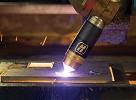
Hypertherm Associates partners with Rapyuta Robotics

Gema welcomes controller

Brushless copper tubing cutter adjusts to ODs up to 2-1/8 in.
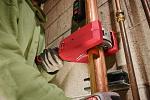
- Industry Events
MME Winnipeg
- April 30, 2024
- Winnipeg, ON Canada
CTMA Economic Uncertainty: Helping You Navigate Windsor Seminar
- April 30, 2024
- Windsor, ON Canada
CTMA Economic Uncertainty: Helping You Navigate Kitchener Seminar
- May 2, 2024
- Kitchener, ON Canada
Automate 2024
- May 6 - 9, 2024
- Chicago, IL
ANCA Open House
- May 7 - 8, 2024
- Wixom, MI













